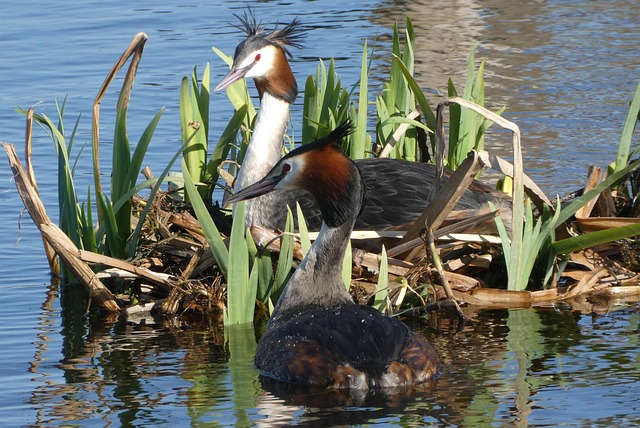Commercial bird nest control services offer specialized solutions for urban and industrial areas, addressing bird-related challenges like nesting on structures near water sources or abundant shelter. Their strategic approach involves non-lethal methods such as habitat modification and scaring techniques, along with controlled removal/relocation of nests. Seasonal strategies are key, preventing nesting during spring, managing breeding season issues, and deterring overwintering in fall/winter. These services ensure property safety, maintain environmental conservation, and promote humane wildlife coexistence, using methods like egg oiling and predator decoys. Long-term strategic planning balances ecological balance and economic stability through sustainable practices, combining inspections, timed removal, and barriers for effective nest management.
In the realm of environmental management, seasonal bird nest planning is crucial for year-round protection. Commercial bird nest control involves understanding unique needs and challenges, especially in dynamic urban settings. This article delves into strategic solutions, offering a comprehensive guide on effective nest management. From seasonal strategies to long-term sustainability, we explore protective measures ensuring safety for both birds and businesses. By adopting these practices, we contribute to a harmonious coexistence and mitigate risks associated with bird nests throughout the year.
Understanding Commercial Bird Nest Control: A Overview of Needs and Challenges
Commercial bird nest control is a specialized service that addresses the complex needs of managing and mitigating bird nests in urban and industrial settings. Unlike residential areas, commercial properties often face unique challenges when it comes to bird nesting due to their proximity to water sources, abundant shelter, and potential food sources. These environments can attract various species, some of which may be protected under local or national wildlife laws, adding an extra layer of complexity.
Effective commercial bird nest control requires a strategic approach that balances the need for property maintenance and safety with environmental conservation. It involves regular inspections to identify nesting sites, non-lethal methods like habitat modification and scaring techniques, and in some cases, controlled removal or relocation of nests. The primary goal is to discourage birds from nesting in specific areas without causing harm to the birds or disrupting their natural behavior.
Seasonal Strategies: Effective Nest Management Throughout the Year
Seasonal strategies are integral to effective bird nest management, ensuring year-round protection for both birds and property owners. In the spring, when migration brings birds back to their nesting grounds, commercial bird nest control services become crucial. These professionals employ humane methods to discourage birds from building nests on structures, minimizing potential damage and health risks associated with bird droppings.
During the breeding season, ongoing monitoring and maintenance are key. This involves regular inspections to identify active nests, followed by strategic interventions like nest removal or relocation. In fall and winter, when birds prepare for migration, management focuses on prevention. By sealing entry points and implementing visual deterrents, commercial services help prevent birds from choosing structures as overwintering sites, reducing the need for intensive control measures during the following spring.
Protective Measures: Mitigating Risks and Ensuring Safety for Birds and Businesses
Protective Measures: Mitigating Risks and Ensuring Safety for Birds and Businesses
In urban areas, commercial bird nest control is essential to balance the coexistence of wildlife and human activities. Effective management plans involve a combination of protective measures designed to mitigate risks for both birds and businesses. This includes regular inspections and maintenance of structures to prevent nests from forming in hazardous locations, such as near electrical equipment or under bridges. By taking proactive steps, businesses can avoid potential safety hazards associated with bird nests, ensuring the well-being of employees and property.
Additionally, using non-lethal methods for nest removal and deterrence is crucial. Trained professionals employ techniques like egg oiling—a safe approach that prevents eggs from hatching—and the strategic placement of predator decoys or noise makers to discourage nesting. These measures not only protect businesses but also promote the well-being of bird populations, fostering a harmonious relationship between humans and wildlife in urban environments.
Long-term Planning: Sustainable Practices for Continuous Bird Nest Management
In the realm of commercial bird nest control, long-term planning is a sustainable practice that ensures continuous bird nest management. This approach involves developing comprehensive strategies that consider the ecological impact and economic feasibility over an extended period. By implementing seasonal bird nest management plans, businesses can proactively address nesting activities throughout the year, minimizing disruptions and conflicts with human activities.
Sustainable practices in commercial bird nest control prioritize non-lethal methods and habitat modification to discourage birds from nesting in unwanted areas. This includes regular inspections, nest removal at appropriate times, and the use of repellents or physical barriers. By integrating these techniques into a structured long-term plan, businesses can effectively manage bird nests without causing harm to the avian population, fostering a harmonious coexistence between human activities and wildlife habitats.
Implementing a comprehensive seasonal bird nest management plan is key to balancing environmental protection and commercial needs. By adopting effective strategies throughout the year, businesses can ensure safe and sustainable practices for both their operations and bird populations. This holistic approach to commercial bird nest control involves understanding unique challenges, implementing protective measures, and fostering long-term partnerships with experts in bird conservation. Through these efforts, we can create a harmonious environment where birds thrive and businesses operate responsibly.
